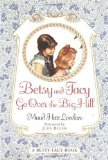 I’ve been feeling rather inadequate about my reviews of this series. That somehow my inadequacy as a reviewer will make it so you won’t have any interest in these books; that you’ll stay away until I’m done with the set, waiting for something better to come along. So it’s probably best that you know that much of my insecurity is stemming from the fact that the set I own comes equipped with forewords. Forewords written by famous people. Famous authors. Like Judy Blume and Ann M. Martin, Joanna Hurwitz and Anna Quindlen. What could I possibly say that they couldn’t say better?
I’ve been feeling rather inadequate about my reviews of this series. That somehow my inadequacy as a reviewer will make it so you won’t have any interest in these books; that you’ll stay away until I’m done with the set, waiting for something better to come along. So it’s probably best that you know that much of my insecurity is stemming from the fact that the set I own comes equipped with forewords. Forewords written by famous people. Famous authors. Like Judy Blume and Ann M. Martin, Joanna Hurwitz and Anna Quindlen. What could I possibly say that they couldn’t say better?
True confessions of inadequacy aside, this book (the third in the series) starts off a bit slowly. I was never terribly interested in the girls wild adoration of the soon-to-be crowned King of Spain (but then again, it’s not like I had any experience close to that. William and Harry were babies, BABIES I TELL YOU when I was growing up. There were no dashing 16 year old princes or kings running about). Also, the part about Little Syria always confused me a bit. This reading (especially the afterword) sorted things out for me a bit. My student readers have sometimes complained that the beginning was boring but stuck with it after some gentle nudging and all reported back that they were glad that they did.
More than the first two, this book has a cohesive story that runs throughout rather than functioning as a set of smaller stories about the friends. This book is really about acceptance. Much of this book is the girls’ exploration of a community on the other side of the Big Hill. It is called Little Syria although its occupants are Lebanese (stay with me here, evidently Lebanon was part of Syria back when these books took place). The Lebanese in this story are Christian and have come to America because their homeland is predominantly Muslim (called Mohammedan in the story) and the Turkish Muslims in particular (yes, Lebanon is part of Syria, but Syria is part of the Ottoman Empire, it’s a lot to keep straight!) are oppressing Christians. The girls initially have a negative reaction to these people: They speak loudly! harshly! strangely! A boy at school has been chased by one who was carrying a knife! But they soon learn to communicate without shared language and befriend a little girl. They discuss hearing kids call the Lebanese people “dago” (Racist slur alert! The girls do point out that this is an unacceptable thing to say.) At one point, boys from their school are bullying the little Lebanese girl. Betsy, Tacy and Tib get right in the middle of it. Dresses are torn, costumes toppled and big sisters eventually step in and fend off the bullies. The girls eventually end up even convincing grown-ups that the Lebanese are not to be feared or shunned. Also, although brief, there is a mention of the girls visiting a deaf-dumb neighbor. There is nothing intentionally hurtful in the use of this term, it speaks more to the age of the book. The girls have learned to communicate with the woman using finger-spelling, and visit her in hopes of getting her to sign a petition.
Again, this is on a 3-5 grade reading level, although younger children may enjoy it as a read aloud.
Sex, Nudity, Dating – The girls declare they are in love with the King of Spain and that Tib should marry him and become queen. They talk about how older sister Julia likes ordinary boys who walk you home and carry your books. At one point Julia struggles into her underwear (just part of a scene about getting dressed).
Profanity – “Gee whiz,” “Gee whitakers,” “Double darn,” “dago” is repeated throughout – it is an racial slur intended to cause pain to the Syrians.
Death, Violence and Gore – There are rumors about one of the Syrians chasing a boy with knives. There is a scuffle when the boys tease the Syrian girl, they take off her kerchief and pull her braids. The Syrian girl lives with her father and grandparents because her mother passed away.
Drugs, Alcohol and Smoking – The little girl’s grandfather smokes a hookah pipe. It is called a narghile or a hubble bubble pipe in the book.
Frightening or Intense Things – Tib gets the grippe (the flu) but it is only mentioned once in passing.

